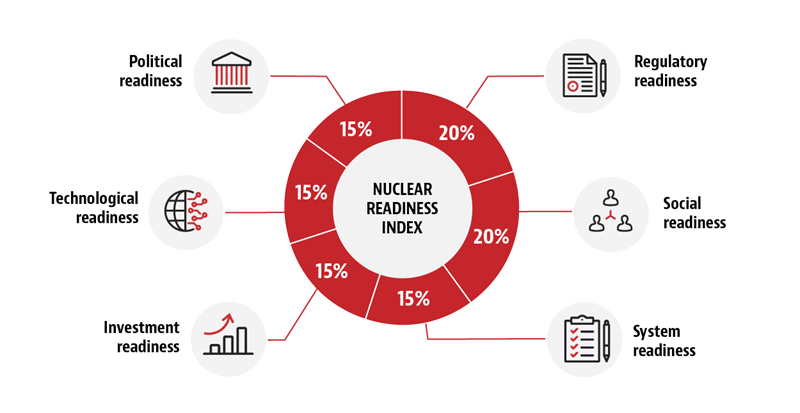Nuclear Readiness Index
The report presents the Nuclear Readiness Index, developed around six key criteria. Experts from Baker McKenzie and Polityka Insight assessed that Poland is currently 58% ready to start the construction of its first large-scale nuclear power plant, EJ1. The highest rating was given to the political aspect (9 out of 10 points in the Index), while the regulatory and social areas each received 8 points. The lowest score (3 points) was given to the technological area, and investment and systemic issues, which include finances, personnel, ancillary investments and the preparation of public administration, received only 4 points each.

Key conclusions
Poland is about 58% ready to start construction of the Choczewo nuclear power plant. See our evaluation of each aspect:
Regulatory aspect

Score: 8 out of 10 points
Poland has a high level of regulatory readiness to begin building a nuclear power plant. However, it still has limited experience in applying these regulations and limited ability to swiftly adapt them to market changes or investors' legitimate needs.
Polish regulations reduce the overall level of risk associated with the construction and operation of nuclear power plants, which is significant from the perspective of planning and obtaining financing for these projects. However, there are still issues that may require legislative solutions, such as the functioning of insurance pools, strengthening local content requirements at the ordering stage, or determining the method of calculating local content.
Agnieszka Skorupińska, Partner leading the sustainability and energy transition team at Baker McKenzie in Warsaw
Social aspect

Score: 8 out of 10 points
Nuclear projects in Poland enjoy strong public support. However, measures are needed to monitor its decline and to skilfully manage public emotions and the "NIMBY" phenomenon.
Political aspect

Score: 9 out of 10 points
Nuclear investments have been supported by both past and present governments, which is reflected in their decisions and policy approach. They are embedded in Poland's energy strategy, including development documents and plans, and are an integral part of Poland's economic policy. Moreover, the construction of nuclear power plants in Poland is supported by the political class at large, local authorities and international actors.
Global recognition of nuclear energy’s role in achieving net zero is growing, yet access to financing, regulatory complexity, and long project timelines remain as barriers. While major financial institutions now back nuclear expansion, success requires well-structured government commitments, legal frameworks and an effective “route to market” for new projects.
Tania Arora, Partner within Baker McKenzie’s Energy, Mining & Infrastructure Group based in London
Spain’s nuclear phase-out between 2027 and 2035 raises concerns about increased dependence on fossil fuels and rising CO2 emissions, potentially jeopardizing the Spanish government’s Paris Agreement commitments. While Spain moves away from nuclear, Poland is taking the opposite approach – leveraging nuclear power to ensure energy security and grid stability amid Europe’s decarbonization efforts.
Manuel Somacarrera, Team Leader within Baker McKenzie’s Energy, Mining & Infrastructure Group at Baker McKenzie Spain
Systemic aspect

Score: 4 out of 10 points
The shortage of qualified personnel is an obstacle to the construction and future operation of nuclear power plants in Poland. Activities aimed at overcoming this shortage are being carried out, although the process of training and attracting specialists is a long-term, multi-stage process and is therefore progressing slowly. Nevertheless, electricity generated by a nuclear power plant is included in the plans to expand the National Electricity System (KSE), although the government's main strategic documents do not adequately define its intended role in the Polish energy sector.
The challenge will be to coordinate the construction of the accompanying infrastructure (e.g. the MOLF Marine Off-Loading Facility) in an optimal way with the progress made in the preparations for the construction of NPP1 itself – even more so as each of these investments is a complex, time-consuming and costly undertaking, and many stakeholders at central and local level are involved in their implementation.
Klaudia Cholewa, Senior Associate in the sustainability and energy transition team at Baker McKenzie in Warsaw
Investment aspect

Score: 4 out of 10 points
Investment progress in the Choczewo nuclear power plant is still relatively low. The signing of the first reactor construction contract (EPC) may be delayed until 2028-2029, before which the following will have to be done: finalisation of discussions on the conclusion of the EDA (Engineering Development Agreement), obtaining EC approval for state aid for the construction and operation of the plant, and finalisation of the financial model for the investment.
The change in perceptions of nuclear energy is visible in the transactional context. Previously institutional investors did not consider this sector attractive. Currently, we are observing growing interest in transactions in this area – if not directly in power plants, then in companies that are part of the broader value chain related to nuclear energy.
Weronika Achramowicz, Managing partner and co-head of the transactional practice at Baker McKenzie in Warsaw
None of the nuclear projects currently being implemented in Poland have fully secured financing at this time. However, the investment in EJ1 is the most advanced, and obtaining the missing funds should not be a significant obstacle to its implementation.
Arkadiusz Ratajczak, Senior Associate in the sustainability and energy transition team at Baker McKenzie in Warsaw
Technological aspect

Score: 3 out of 10 points
In the case of the Choczewo plant, the investor has yet to make key decisions on the supply chains for key goods and services. Other nuclear projects in Poland are at an early stage of development.






